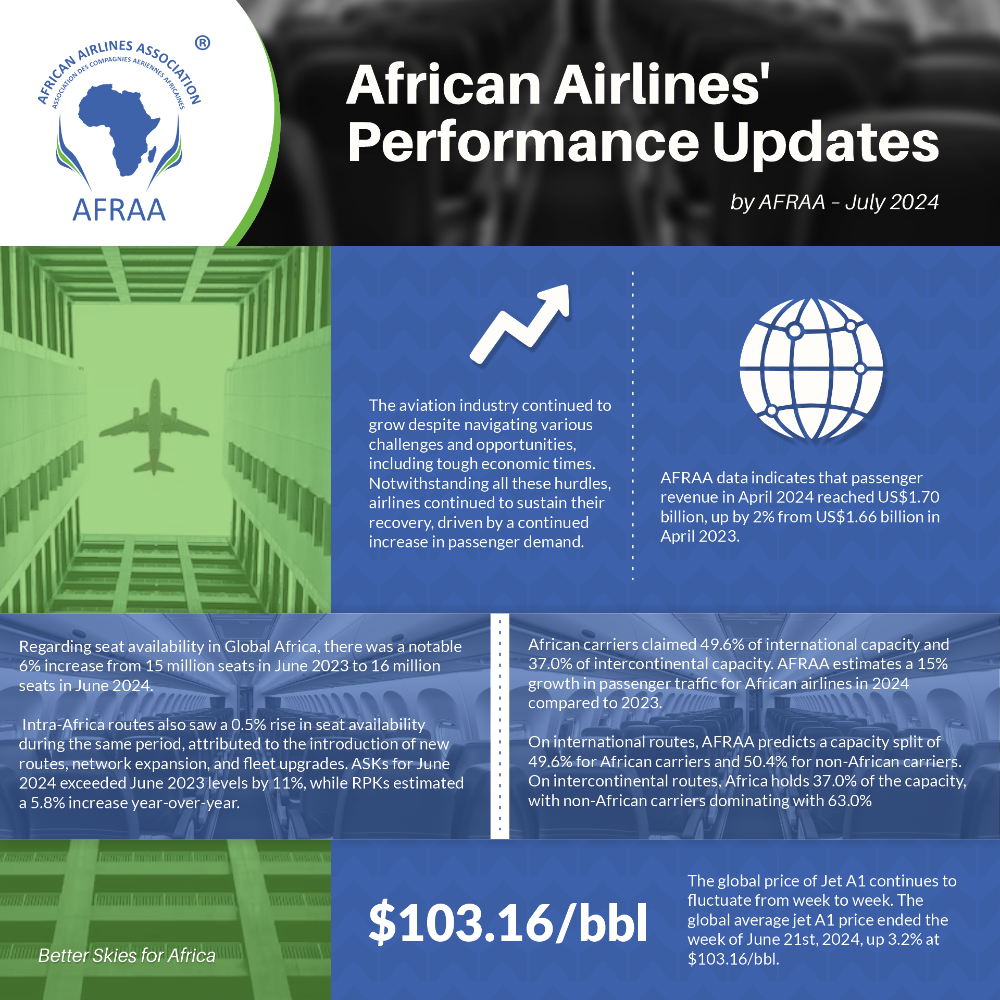(Posted 12th July 2024)

Airline Performance
In Q2 2024, the aviation industry continued to grow despite navigating various challenges and opportunities, including tough economic times. Notwithstanding all these hurdles, airlines continued to sustain their recovery, driven by a continued increase in passenger demand.
Regarding seat availability in Global Africa, there was a notable 6% increase from 15 million seats in June 2023 to 16 million seats in June 2024. Intra-Africa routes also saw a 0.5% rise in seat availability during the same period, attributed to the introduction of new routes, network expansion, and fleet upgrades. ASKs for June 2024 exceeded June 2023 levels by 11%, while RPKs estimated a 5.8% increase year-over-year.
African carriers claimed 49.6% of international capacity and 37.0% of intercontinental capacity. AFRAA estimates a 15% growth in passenger traffic for African airlines in 2024 compared to 2023. On international routes, AFRAA predicts a capacity split of 49.6% for African carriers and 50.4% for non-African carriers. On intercontinental routes, Africa holds 37.0% of the capacity, with non-African carriers dominating with 63.0%.
Connectivity within Africa continues to expand, with major hubs like Addis Ababa, Nairobi, Abidjan, and Lomé experiencing significant increases in connections. African airlines are reporting improved passenger revenue, reflecting the overall traffic growth. AFRAA data indicates that passenger revenue in April 2024 reached US$1.70 billion, up by 2% from US$1.66 billion in April 2023.
The global price of Jet A1 continues to fluctuate from week to week. The global average jet A1 price ended the week of June 21st, 2024, up 3.2% at $103.16/bbl.
Regulatory/Industry Affairs
In its strive to harmonize regulations on the Continent, AFCAC has developed model economic regulations that can be used as a guide in developing or reviewing a Country’s aviation economic regulation. The model regulations cover economic licensing for scheduled and non-scheduled air transport services and allied services such as ground handling and catering.
The regulation mandates financial monitoring and operational data submission for domestic airlines, ensuring transparency and efficiency. It provides for economic oversight of airports and air navigation service providers (ANSPs), emphasizing consumer protection through passenger rights and compensation guidelines.
The regulation aims to foster a balanced and fair aviation sector across Africa through monitoring, enforcement, and reporting mechanisms. AFCAC is undertaking validation of the regulations in Lomé, Togo, from 26-28 June and 1-3 July in Kigali, Rwanda, where AFRAA will submit the proposed regulations.
From the 2024 first half-year survey conducted by AFRAA, a number of countries have yet to fully liberalize and implement SAATM, as evidenced by the denial of 5th Freedom Rights. AFRAA is to undertake coordinated measures with AFCAC to facilitate the grant of freedoms. The survey has also highlighted that the lack of political goodwill and reciprocity are the biggest hindrances to full SAATM implementation. The survey has also identified some taxes and charges that increase operational costs, and AFRAA will be making the necessary petitions on this as well as continue encouraging the adoption of measures such as fleet modernization, implementation of free routing airspace and continued participation in carbon offset programs in ensuring environmental sustainability.
Namibia’s proposal to remove visa-free entry for citizens of 31 countries is expected to have a negative impact on tourism, business travel, and economic growth. In other developments, Angola, Botswana, Namibia, Zambia, and Zimbabwe plan to introduce a single tourist visa, similar to the Schengen visa, allowing entry to all five countries for a short period. Zambia and Zimbabwe already have already started implementation and have the “UniVisa” for entry to both countries and short stays in Botswana.
Nigeria is launching a new e-visa system with electronic gates at major airports to streamline visa applications as per Nigeria Visa Policy 2020. Togo and São Tomé and Príncipe have signed an agreement for visa-free travel between their citizens, aiming to enhance movement and connectivity between the two West African nations.
In two separate studies undertaken by Airbus and Boeing on unserved air routes and the biggest hindrance to interconnectivity on the African Continent, respectively, it’s observed that factors such as restrictive bilateral agreements, airline capacity challenges and high operating costs need to be addressed to ensure interconnectivity on the African Continent.
Despite Nigeria releasing almost 98% of the funds that were blocked in the country, the continent continues to grapple with blocked funds. AFRAA’s Task Force on Blocked Funds will engage with the relevant government offices to facilitate the unblocking of these airline funds.






